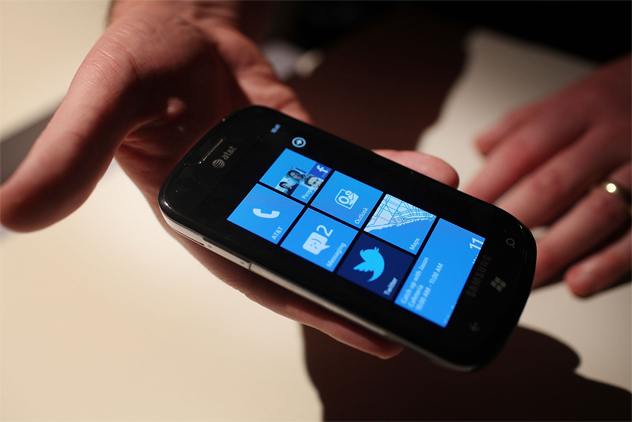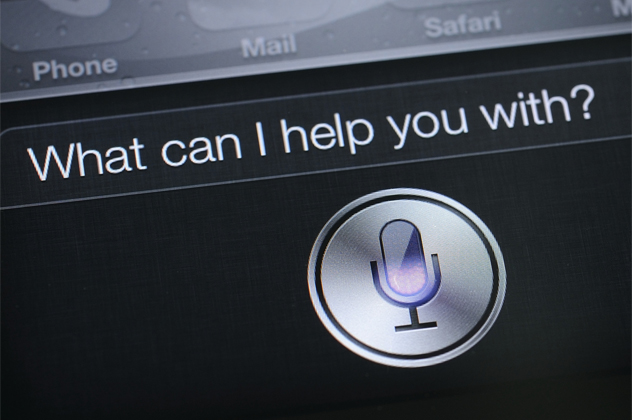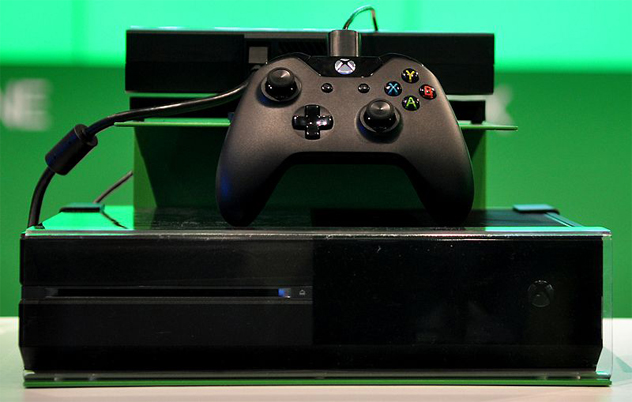10The First National Bank Of Chicago Error
Imagine being a typical employee of the local gas company, checking the balance on your bank account, and finding that you now have over $900 million. That’s what happened to Sylvester Dorsey in May 1996, along with 825 other customers of the First National Bank of Chicago. “I showed the receipt to a friend and we just started screaming,” said Dorsey. Jeff Ferrera, another lucky bank customer, said, “It was just unique being called a billionaire for a day.” James Lancaster, senior vice president at First National, said the windfalls were caused by “a computer programming error.” According to the Chicago Tribune, “Nobody, to the bank’s knowledge, ran off to the Cayman Islands with the money.” That’s probably a good thing, because the total value of the error was about $764 billion, far more than the total assets of the bank. At the time, it was the largest banking error in US history.
9Windows Phone 8 Says To Insert A Disc
Windows Phone was Microsoft’s answer to the iPhone. The first version, named Windows Phone 7, launched in October 2010. The next major version, Windows Phone 8, launched in October 2012. But although the phone was well received, it wasn’t all smooth sailing: Some Windows Phone 8 users ran into an amusing situation where Windows failed to start and the screen showed an error message which instructed them to “Insert your Windows installation disc and restart your computer.” It didn’t say where to insert the disc. It seems that some of the users who got the message had been trying to load modified firmware onto their phone, and this was the phone’s way of saying “no.” Others claimed that the error occurred “without any provocation.” That message came up because Windows Phone 8 is based on the Windows NT kernel, a kernel which first came out in 1993. It has been used as the core of all Windows desktop operating systems since Windows 2000, including XP, Vista, 7, and 8. As a result, Windows Phone 8 sometimes thinks it’s a desktop operating system.
8Siri’s Recommended Smartphone Was A Nokia
Siri is Apple’s personal assistant for the iPhone and iPad. You can ask it questions using everyday language and it gives an answer. In 2012, you could ask Siri “What’s the best cell phone ever?” and it would respond “Nokia—Lumia 900 4G Mobile Phone—Cyan (AT&T).” Siri recommended a competitor’s smartphone! The gaffe happened because Siri passed the question to Wolfram Alpha, a “computational knowledge engine” operated by another company. Wolfram Alpha interpreted the question as asking for the best mobile phone based on customer reviews. At the time, the available information led Wolfram Alpha to conclude that the answer was a Nokia phone. Apple has updated Siri since then, so the answer is different now. In fact, several answers are possible, including “You’re kidding, right?” and “The one you’re holding.”
7Baby Glitches In ‘The Sims 3’
The Sims 3 is a “strategic life simulation game” developed by The Sims Studio and published by Electronic Arts (EA). It came out in 2009 and is one of the best-selling video games of all time. Video games are notoriously difficult to get perfect, and The Sims 3 is no exception. Unlike most video games, The Sims 3 has babies, a fact that enables all sorts of weird and embarrassing glitches. For example, The Sims 3 allows users to create custom content and share it with others. It turns out that some custom clothing can make babies do animations intended for bigger avatars, causing their tiny baby skeletons to stretch and contort into long-armed, long-fingered pretzels. Some people call them demon babies. Even more embarrassing is the fact that some in-game babysitters used to take babies. They’d just carry the baby out of the house. One might wonder if this was some game designer’s twisted idea of intriguing drama, but the babysitters seemed to be oblivious to the fact that they were taking the baby. The klepto-nanny glitch was fixed in June 2009. Then there’s the infinite baby loop. When a baby is born, you get a chance to name it. Sometimes you get asked a second time, and a third time, and so on, with each naming generating a new baby. One can get dozens of babies, with no apparent limit.
6The Xbox One Password Back Door
Parents and children often share the same console, but many parents don’t want their kids playing certain games. To address this, Microsoft’s Xbox One has an account system, with each account having different capabilities. One can set up an account for each adult and child, with some accounts requiring a password to log in. In March 2014, a five-year-old discovered that he could get into his dad’s Xbox One account by giving the wrong password at the first prompt, then entering nothing but spaces as the second password. When asked how he felt when he discovered the back door, he said, “I was like, yeah!” Suddenly he was able to play all his dad’s games. His dad is a security researcher, so when he saw his son using his account, he asked him how he’d gotten past the password. Once he found out, he reported the back door to Microsoft, and Microsoft patched it. Microsoft even listed his son, Kristoffer Wilhelm von Hassel, in their official list of “March 2014 Security Researchers.” Some people have jokingly referred to Kristoffer as the world’s youngest white-hat hacker.
5Android’s Text Messaging Bug
Imagine using your smartphone to text something private or embarrassing to your significant other and finding out later that it was sent to your boss instead. Well, Android had a bug that did just that. The bug was in the default Android Messaging Application. It was first reported to Android developers on June 28, 2010, but it wasn’t acknowledged until January 5, 2011. In a comment on an online forum, an Android Open Source Project Member (probably a Google employee) wrote: “Thanks to everyone for your patience while we’ve been investigating these reports . . . some users have reported that their SMS messages are being delivered to the wrong people. It took us some time to reproduce this issue, as it appears that it’s only occurring very rarely. Even so, we’ve now managed to both reproduce it and develop a fix that we will deploy.”
4Prisoners Released Early
In 2011, California’s prisons were getting overcrowded, so a decision was made to release some low-risk prisoners. Unfortunately, some computer errors caused them to release a few high-risk prisoners instead. One estimate was that approximately 450 inmates with “a high risk for violence” were mistakenly released, along with “more than 1,000 additional prisoners presenting a high risk of committing drug crimes, property crimes and other offenses.” What’s more, the early-release program released the prisoners under “non-revocable parole,” which meant that they didn’t have to report to a parole officer. Even worse, nobody attempted to bring the prisoners back into custody after they were mistakenly released. A similar incident happened in Michigan, where a “flaw in computer programming” let 23 prisoners out early between 2003 and 2005. Those inmates were doing time for crimes such as embezzlement, drug trafficking, and check fraud.
3The $90 Million Power Bill
Nigel and Linda Brotherton of Lancashire, England recently switched their electricity supplier from Scottish Power to Npower. Their first bill from Npower read, “Your monthly payment has increased from £87.00 to £53,480,062.00” (about $90 million US). What happened? Apparently, after switching to Npower, “a man was sent round to read their meter. When he entered a reading of ‘zero,’ Npower’s computer wrongly assumed the dials must have gone all round the clock—and automatically flagged up the huge bill.” Computers don’t assume anything, of course. They just run software. Whoever programmed Npower’s software didn’t anticipate that another way for the meter reading to go to “zero” was for someone to set it there manually. In response to the whole thing, Nigel said, “It’s a good job they didn’t actually try to take all that money from my bank account. Not only would it have gone way over my overdraft limit, but it could have brought down the bank.”
2Bill Gates’s Windows 98 Demo Fail
Microsoft Windows 95 came out in August, 1995. The Guardian called it “the world’s first celebrity computer programme.” It was a huge success, selling 40 million copies in the first year. Would Windows 98, its successor, be even better? The world would soon find out with a glimpse into the software at the 1998 COMDEX convention. In those days, COMDEX was a huge computer trade show. All the tech reporters came to see the latest hardware and software. Microsoft used the 1998 Spring COMDEX to demonstrate their new beta version of Windows 98. The presenters were Microsoft co-founder Bill Gates and Chris Capossela, a Microsoft employee. The event was broadcast live on CNN. The demo started out well. Then it came time to demonstrate Windows 98’s enhanced support for “Plug and Play” devices. They plugged a scanner into the computer. Windows 98 was supposed to notice the scanner and work with it. Instead, Windows 98 crashed. The computer screen showed the notorious Blue Screen of Death, indicating a fatal system error. The audience laughed, and Gates attempted a recovery, saying, “That must be why we’re not shipping Windows 98 yet.”
1Fountains Of Cats In ‘Minecraft’
Minecraft is a “sandbox” video game that’s popular with kids. Players can build things with almost no limit in scope, including working computers and recreations of entire fictional cities. Basically, it’s impossible to predict all the bizarre things that can be built in a sandbox video game. One of the most amusingly absurd things you can make in Minecraft is an infinite fountain of cats falling from the top of a stone pillar. One of the animal types in Minecraft is the ocelot. These can be tamed and, once tame, they’ll become cats that follow you around. Normally, they walk behind you on the ground, but if you get far enough away, they will teleport to get closer to you. So if you’re at the top of a tall stone pillar, your cats will teleport to the top of the pillar, walk around, and fall off in a never-ending stream. (Watch at about 1:30 in the video above.) Troy McConaghy is a researcher and writer from Canada. @TroyMc on Twitter.
























